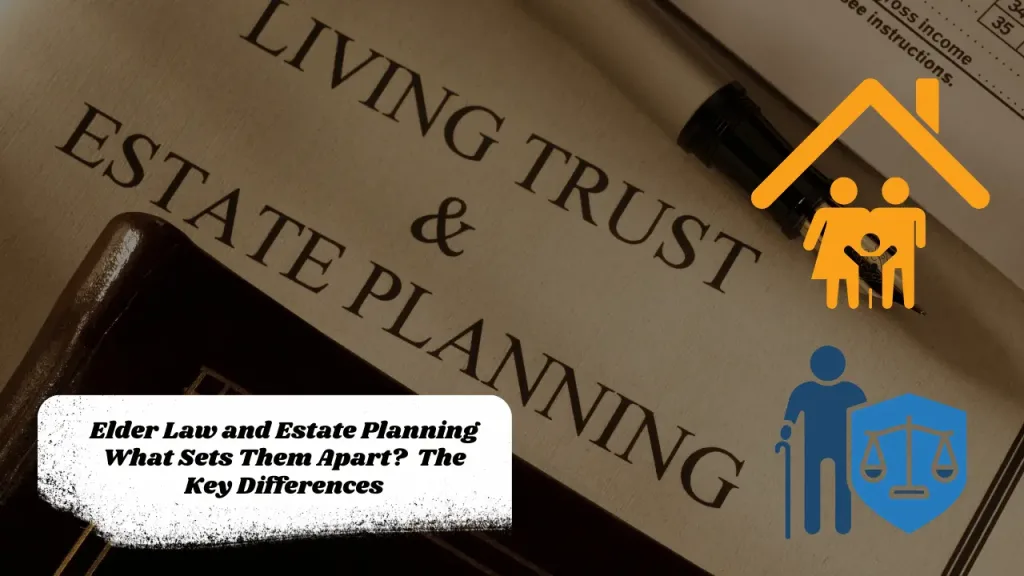Elder Law and Estate Planning What Sets Them Apart? The Key Differences
When planning for the future, terms like “elder law” and “estate planning” often arise, yet many people are unsure how these two legal fields differ. Both play critical roles in ensuring financial security and addressing the legal needs of individuals and families, especially as they age. However, their focus, goals, and scope vary significantly. Below, we explore the key differences and intersections between elder law and estate planning to provide a clear understanding of their purposes.
What is Elder Law?
Elder law is a specialized area of law focused on addressing the unique legal and financial challenges that older adults face. Its primary goal is to protect the rights, well-being, and assets of seniors while ensuring access to proper care and support.
Key Areas of Elder Law:
- Long-Term Care Planning:
- Assistance with navigating the costs of nursing home or in-home care.
- Strategies to qualify for government programs like Medicaid without depleting life savings.
- Medicaid and Medicare Guidance:
- Legal advice on Medicaid eligibility and asset protection.
- Appeals for Medicare coverage denials.
- Guardianship and Conservatorship:
- Establishing legal arrangements for individuals who can no longer manage their personal or financial affairs.
- Elder Abuse Protection:
- Legal support in cases of elder abuse, neglect, or financial exploitation.
- Disability and Incapacity Planning:
- Drafting advance directives and health care proxies to ensure medical wishes are respected.
Elder law attorneys often address immediate or short-term needs for seniors, such as qualifying for benefits or resolving a health care crisis.
Related article for you:
Is Real Estate Law a Good Career? Salary, Qualifications, and Opportunities

What is Estate Planning?
Estate planning, on the other hand, involves organizing and managing an individual’s assets to ensure they are distributed according to their wishes after death. Estate planning also prepares for potential incapacity during one’s lifetime, offering strategies to safeguard financial and medical decision-making.
Key Areas of Estate Planning:
- Wills and Trusts:
- Drafting wills to specify how assets will be distributed.
- Creating trusts (revocable or irrevocable) to manage assets and avoid probate.
- Asset Protection and Tax Planning:
- Strategies to minimize estate taxes and preserve wealth for future generations.
- Guardianship for Minors:
- Appointing guardians for minor children in case of the parent’s untimely death.
- Healthcare and Financial Powers of Attorney:
- Designating trusted individuals to make decisions if the person becomes incapacitated.
- Charitable Giving:
- Structuring gifts to charities or causes in a tax-efficient manner.
Unlike elder law, estate planning often focuses on long-term goals and strategies that span an individual’s lifetime and extend beyond their passing.
Key Differences Between Elder Law and Estate Planning
1. Focus and Purpose
- Elder Law: Protects the rights and well-being of seniors by addressing issues related to aging, health care, and financial security.
- Estate Planning: Organizes and manages the distribution of an individual’s assets and legal affairs to ensure their wishes are carried out efficiently.
2. Primary Goals
- Elder Law: Ensures access to long-term care, protects assets from being depleted, and safeguards against elder abuse or exploitation.
- Estate Planning: Focuses on minimizing taxes, protecting wealth, and providing for loved ones or charitable causes after death.
3. Scope of Issues Covered
- Elder Law:
- Medicaid and Medicare eligibility.
- Guardianship, elder abuse, and incapacity planning.
- Long-term care and disability planning.
- Estate Planning:
- Wills, trusts, and probate avoidance.
- Tax-efficient wealth transfer.
- Guardianship for minors and powers of attorney.
4. Timeframe
- Elder Law: Often addresses immediate or urgent needs, such as qualifying for Medicaid or dealing with a health care crisis.
- Estate Planning: Focuses on preparing for the long term, often spanning decades and including plans for incapacity and post-death asset distribution.
5. Target Audience
- Elder Law: Primarily serves seniors and their families.
- Estate Planning: Relevant for individuals of all ages who want to manage their assets and ensure their wishes are fulfilled.
Overlap Between Elder Law and Estate Planning
While elder law and estate planning are distinct areas, they often intersect. For example:
- Both involve creating powers of attorney and advance health care directives.
- Asset protection strategies may overlap, as both fields aim to preserve wealth—elder law to qualify for Medicaid and estate planning to minimize taxes.
- Families often consult elder law and estate planning attorneys together to create a comprehensive plan addressing immediate needs and long-term goals.
Choosing the Right Approach
Deciding whether to focus on elder law, estate planning, or both depends on your current needs and stage of life:
- If you or a loved one is entering senior years and facing concerns about health care costs, Medicaid eligibility, or elder abuse, elder law is essential.
- If your primary concern is organizing your assets for efficient transfer to loved ones or protecting them from estate taxes, estate planning is the right choice.
- Many individuals benefit from combining the two to create a holistic plan that addresses immediate needs while safeguarding the future.
Conclusion
Elder law and estate planning are complementary legal disciplines that help individuals and families navigate the complexities of aging, asset management, and legacy planning. Understanding their differences allows you to make informed decisions and work with legal professionals to create a comprehensive plan tailored to your unique circumstances. Whether you’re planning for a loved one’s care or safeguarding your family’s financial future, addressing both areas can provide peace of mind and security for years to come.
About the Author

Sarah Klein, JD, is an experienced estate planning attorney who has helped clients with wills, trusts, powers of attorney, and probate matters. At All About Lawyer, she simplifies complex estate laws so families can protect their assets, plan ahead, and avoid legal headaches during life’s most sensitive moments.
Read more about Sarah
